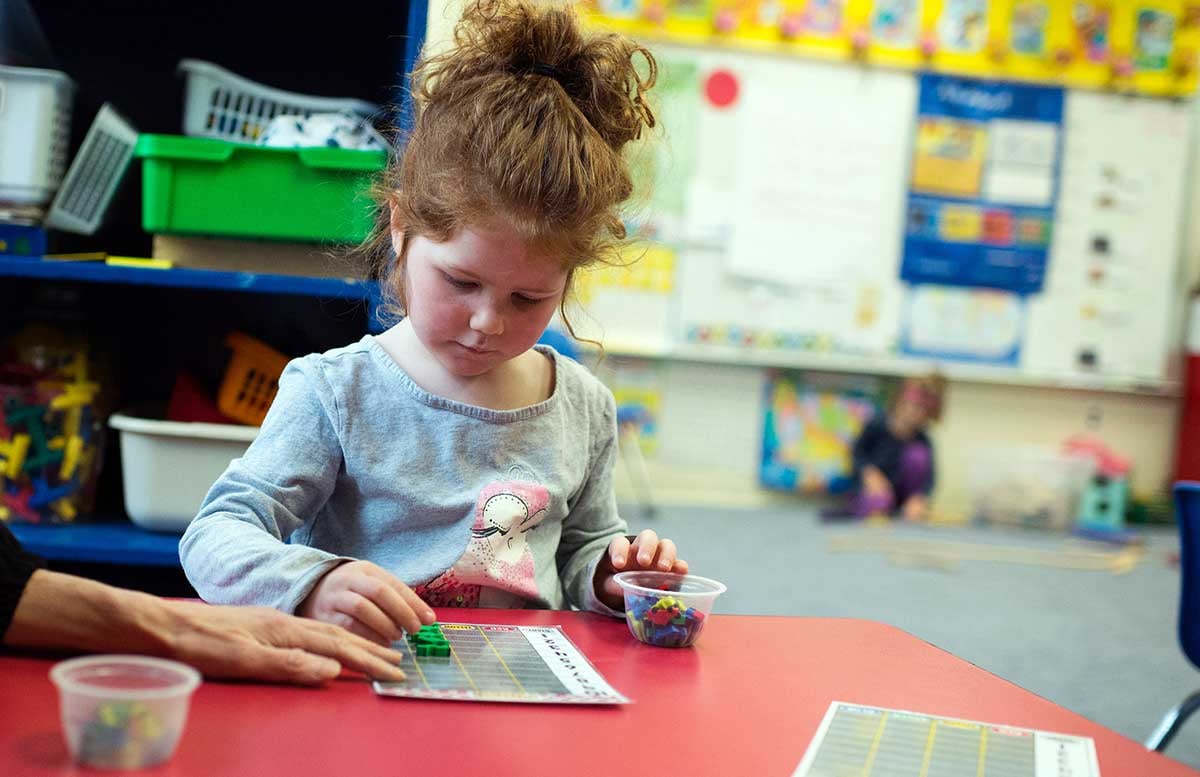
If you’re a parent of a young child who is almost ready for pre-k or kindergarten, then you’ve probably spent a lot of time thinking about how you can help them prepare to do well in school. Specifically, you’ve thought about the skills your child needs before they enter the classroom so that they get the most out of their education.
You know that reading and writing top the list of important academic skills, and you’ve likely taken steps to lay the foundation your child needs to develop their language skills. You read with them, you’ve taught them to hold a crayon or pencil, you've begun associating certain letters with certain sounds, and you are always talking with them, which helps them learn new vocabulary and develop conversational skills. All of this means that you are spending hours each day helping your child develop the language skills that they will need in school.
But how many hours do you dedicate to helping your child learn math? The answer for most parents - not many!
The Importance of Early Math
Research tells us that early exposure to math is one of the most important contributors to future academic success. Math helps children develop the confidence, curiosity, flexibility, inventiveness, and persistence that they will use throughout their education and their lives.
Free Downloadable Guide: Take a Closer Look at Friends' Central School
The earliest years are very important when it comes to laying this critical foundation, and that means that exposure to math should ideally begin before the child is enrolled in school. Because most parents aren’t trained math teachers, we wanted to pull together some advice that you can use to help your child develop confidence, familiarity, and—eventually—a love of math.
Which math skills are the most important for young children to learn? While it might be nice to daydream about your three-year-old becoming a whiz at advanced calculus, the truth is, just embracing the basics can help you set your child up for success. Some of the most important math skills for young children include:
- Number Sense: Knowing what individual numbers look like and understanding that certain numbers are larger (or smaller) than others
- Ordering: Understanding how numbers fall along a scale, for example from 1 to 10 or from 1 to 20
- Spatial Sense: Being able to identify different shapes and spaces that will later be used in geometry
- Pattern Recognition: Being able to identify repeating patterns, whether in numbers, shapes, music, art, or elsewhere
- Measurement: Understanding that numbers (and the world around us) are measurable and that there are ways to quantify them, for example with a ruler or with measuring cups
- Operations: Having an early understanding of basic operations (addition, subtraction, multiplication, division), as applied in real life ways
4 Ways Parents Can Help Their Young Children Love Math
Knowing that your child should learn these skills is one thing. Actually teaching them the skills is another thing entirely—and it can be easy for parents to feel a little overwhelmed when it comes to teaching their child about math. You aren’t a math teacher, after all!
Luckily, you don’t have to be. Below, we’ve gathered advice and tips that you can use to help your child learn not only how to do math, but also how to love it.
1. Find ways to incorporate math into everyday life.
Just like reading, writing, and speaking help your child to develop the language skills that they will use throughout their life, so too, does regularly practicing math skills.
But that doesn’t mean sitting your child down with worksheets. The single best way to help your child learn the basics is by incorporating math into their everyday activities. This will give your child the practice that they need, while also helping them to understand that there are real-world applications to what they are learning (which will come in especially helpful when they are older).
Some easy ways to build math into the everyday include:
- Asking your child to set the table, and asking them how many of each item (forks, spoons, plates) is needed
- Asking your child to divide different fruits (like grapes) into baggies for snack time
- Asking your child to help you measure (and count) ingredients when cooking or baking
2. Find ways to make math fun.
As a parent, you know that any time you call something work, your child may instinctively dislike it. But if you can frame something like work or learning as being “fun,” then there’s a much better chance that they will enjoy it.
Though “math” and “fun” may seem like two words that should never be used in the same sentence, there are plenty of ways that parents can build math into the games and activities that their children are already playing and completing:
- During playtime, ask your child to count out and retrieve a certain number of toys.
- Use Legos or another block to build different shapes and structures.
- During a long car ride, play I-Spy or “Guess the Number in My Head,” both of which can help your child reinforce counting skills while also laying some foundation around logic.
- When at the museum or aquarium, ask your child to count the number of circles in a painting or the amount of fish in a tank.
What about math-based video games? While they won’t hurt, they also aren’t best for young children, who are ideally taught by interacting with the world around them. Save the math-based video games for when your child is a little older, when they see the games as a treat.
3. Use real math language in daily life.
When it comes to teaching your child about math, it is hard to overstate the importance of using real math language in daily life. Just as using a variety of words when you speak to your child helps them build their vocabulary, using math-related words and terms can do wonders for their math skills. Doing so will help your child to become familiar with the words and concepts that they will need to use later on in school, and this familiarity can help them to build the confidence that is so important in education.
For example, you might ask your child to:
- Add up the forks on the table.
- Subtract extra plates if you’ve laid out too many.
- Divide the grapes into baggies.
- Multiply one table setting by four so the entire family can eat.
4. Resist talking negatively about math.
Even if you don’t like math, don’t think you are good at math, or didn’t do well in math as a child, you shouldn't speak negatively about math with your child. Doing so can drill in a negative perception that they can then carry with them throughout their lives.
Instead, when you talk about math, try to do so positively. Rather than doing math reluctantly, share with your children what a wonderful tool and skill math can be to helping them achieve their goals. Show your child from an early age that math is important, and they will naturally want to learn about it and do better.
And, remember: There is no such thing as a “math person”—everyone can learn to love math!
It’s not about memorization
In math, as in any subject, it’s easy for parents, teachers, and children themselves to become focused on being “right.” But while getting the correct answer is, of course, one of the goals of learning, putting too much focus on it can lead to a mindset that values the answer more than the process. Focus on teaching your child the underlying process and logic—and not simply memorizing numbers, facts, and operations—and everything else tends to fall into place.



